- Home
- Tamora Pierce
Briar's Book Page 2
Briar's Book Read online
Page 2
“I’m going no place,” Briar replied. “I got a quicker way to talk to Rosethorn than hiking back to the Mire.”
“She won’t come for no street rat,” said Flick tiredly. “Nobody cares if we live or die.”
“Shows what you know,” Briar retorted. “Where do I ask her to come?”
Flick shook her head.
“Didn’t I nick cough syrup for you back in Wolf Moon, that fixed you up?” demanded Briar. “Didn’t I teach you how to throw a knife last time? I swear Rosethorn’s all right. I swear.”
Alleypup stripped off his filthy shirt and breeches, tossing them into a corner. The clothes he yanked from an open crate were somewhat cleaner. “Tell her meet me at the Guildhall clock.” He pulled a worn tunic over his head.
Climbing the rags behind Flick, Briar pressed his hands to the raw earth at the rear of the cave. Even in the lamplight he could see roots hanging down. There were plants everywhere in the city. Digging his fingers into the rich dirt, he brushed a handful of rootlets, the beginnings of a vast underground web.
He and Rosethorn had thought of this over the winter. They could not speak mind-to-mind without touching, but they could talk through a web of plants. Closing his eyes, he found his magic, cool and firm with life. He passed it through his fingers, into the pale underground roots that had reached from the dirt to wrap around his hands.
His power split into a thousand small threads that flowed through grass and rose, ivy and moss, yew and cedar and ash roots. From one plant to another he sped, going in all directions except back. At the city wall he pulled himself together into a few dozen streams, plunging under the stone barrier to emerge in the tangle of weeds and poor men’s trees of the Mire. He scrambled forward, Rosethorn now a blaze ahead of him, towering in his magical sight like a giant tree.
Ivy grew on the sides of Urda’s House, framing the windows of the room where she worked. By the time he got there, she was opening the shutters.
This had better be good, she told him mind-to-mind as she gently wrapped her fingers in his vine-self. I’m in no mood for jokes.
He told her everything. When he was done, she untangled herself from the vine. He waited for her to reply, then realized she was gone, walking to the lower levels of the house. Just like her, not even to say she’s leaving, Briar thought. Letting go of the ivy, he raced back through roots again, falling into his own body. Only when he’d carefully freed himself of the roots in the wall did he try to speak to Flick and Alleypup. “Rosethorn. She’s on her way.”
“I’m off,” said the other boy. He picked up one of the lamps and left.
Coming out from behind Flick, Briar noticed the water bucket and ladle. “Have you washed at all?” he asked.
She looked at him, feverish eyes scornful. “You think they let me in the city baths?” she wanted to know. “Dippin’ my toesies with the draymen and the drunks? Did you think—”
Briar held up a hand, and Flick caught her breath. “Sorry,” she mumbled. “I washed the first day of spots, before I got too tired. I’m weaker’n a kitten now.”
Briar nodded. “Do you boil your water?”
“Why?” she demanded. “We get water from the Potter’s Lane fountain. It’s good enough.”
“Even good water goes bad, ‘specially if dung and pee leak into it.” And I think maybe it is leaking in, Briar thought, but didn’t say. “Maybe your water that ain’t boiled is what got you sick.”
“I had spots before I washed,” Flick pointed out.
“So maybe you drank it.” Briar could speak with confidence about this. One of his teachers had spent an entire winter’s day talking about diseases in water. “You can’t tell water’s bad by looking.”
“Wood and kettles cost money,” growled Flick. “Don’t yatter at me, Briar. My head’s all swimmy.”
“Sorry.” Briar watched as she settled back, trying to get comfortable. Within minutes she was dozing.
He kept watch until he sensed Rosethorn’s approach. “You took forever,” he said when she and Alleypup walked into the cave. “I know turtles was quicker on the move.”
Rosethorn’s dark eyes took in the state of Briar’s clothes; the corners of her mouth turned down. “That will be enough from you, my lad,” she said. “This is our patient?” As she passed, she thrust her workbag into his hand.
Briar drew out a small, heavy pouch. Dumping its contents into one hand, he revealed a round crystal the size of his palm. Inside burned a steady, bright core of jagged light that put the smoking lamp to shame. He carried the light to a niche close to Flick and set it there. Its glare lit the street girl’s spots cruelly. Rosethorn knelt beside her without a thought for her earth-green habit.
“Just hold still,” she told Flick, her sharp voice gentle for once. “I try not to kill anyone who’s already sick if I can help it.”
Alleypup tugged on Briar’s sleeve and pointed to the crystal lamp. “How’d you do that? Make it light up?” His eyes were hungry as they rested on the light.
“My mate Tris done it,” said Briar, watching Rosethorn in case she needed anything. “She put lightning in a crystal ball.”
“Briar, I need my glass,” Rosethorn ordered. “And I want quiet, understood?”
“Yes, Lady,” replied Alleypup.
Briar grinned—Rosethorn was always convincing—and took a velvet pouch from the workbag. Carefully he slid out its contents: a round lens four inches across, its edges bound in a metal band, fixed to a metal handle. He passed it to his teacher.
Rosethorn examined Flick, talking softly to her the entire time. At last the dedicate sat back, frowning. “When did you get sick, and how did this illness develop?”
Flick answered weakly. At last Rosethorn stood, holding the lens out for Briar to take. As he did, he saw that drops of sweat had formed like pearls on Rosethorn’s pale skin. For all that she acted calm, she was upset, as upset as she’d ever been when facing pirates or forest fires.
For a moment she was silent. Finally she straightened her shoulders and back. “This will take arranging, I think. Briar, I need you to link me to Niko—I assume he’s at the duke’s with the girls. Getting Flick to Urda’s House will be tricky.”
When Flick opened her mouth to protest, Rosethorn glared at her, fisted hands on hips. “Something for you?” she asked ominously.
Flick shook her head and sank back on her rags. Briar grinned: he’d known Flick was smart.
“Has anyone else been here since you first got sick?” asked Rosethorn.
“Just me, and I been out and about,” said Alleypup. “Nickin’ food and the like.”
“We’ll need to make a list of everyone you saw, then,” Rosethorn murmured, thinking aloud. “Briar? Have the girls link us with Niko, please.”
Briar closed his eyes as Rosethorn wrapped her hands around his. Unlike talking to Rosethorn at Urda’s House, speaking to any of the girls was easy. He only had to look for them in his own mind.
2
Vedris IV, ruling Duke of Emelan, put down his empty teacup and smiled at his favorite great-niece. Lady Sandrilene fa Toren smiled back, glad that her visit had pleased him. The duke had passed a long, hard winter trying to repair the damage of last summer’s earthquake, pirate attacks in the south, and a three-year drought in the north. Spring, with its promise of trade and new crops, was nearly come at last, and he could afford to relax with Sandry and her friends.
He didn’t look worn down in the least, Sandry noticed. His brown eyes bore dark circles from too little sleep and the lines in his fleshy face were deeper, but his chin and jaw were still hard, his arched nose still proud. He dressed simply, but that was normal: her uncle was no fashion peacock. Vedris IV had no need to impress others with costly jewels and clothes. Instead he wore power and majesty like a cloak.
Sandry had changed from her riding clothes as soon as their group had reached Duke’s Citadel. Now she was elegant, but only because she knew her uncle liked to see her dressed suitab
ly for her rank now and then. Her gray, sleeveless overgown was beautifully woven and trimmed with black silk braid; her white silk undergown had silver embroidery on the flowing sleeves. Her brown hair, sun-streaked most of the year, was neatly combed, braided, and pinned under a gray silk veil. The quiet elegance of her appearance was countered by her vivid blue eyes and by the firm set of her round chin.
“More tea, Uncle?” she asked, reaching for the pot. “Niko? Tris?”
The steel-haired man on the balcony that opened onto the study shook his head, as did the chubby redhead seated atop the ladder that touched the highest of the room’s bookshelves. The duke sighed and put down his cup. “I should see what Niko wants,” he remarked, his elegant voice just loud enough to reach Sandry’s ears. “I know it’s trouble just from looking at him, and I had hoped for just one week with no bad news.”
Sandry looked again at Niklaren Goldeye, the mage who had brought her, Briar, Tris, and their absent housemate, Daja, together. He was gazing at the city below. Niko’s heavy black eyebrows were knit together over a craggy nose; the tight set of his lined face showed he was deeply worried. He had been like that for days. After over a year’s friendship with him, Sandry knew the signs: he had read the future and seen dangerous events.
“I wish you could have gone without bad news, too, Uncle,” she admitted.
The duke got to his feet. “Let’s see from what direction this gale blows,” he remarked, and went out onto the balcony.
Sandry looked up at Trisana Chandler. The redhead had found a book to interest her. Rather than climb down the ladder, she perched on it, her bespectacled nose close to the volume’s open pages.
Someone—the duke or Niko—closed the balcony door. Sandry put down her teacup and went over to the ladder. “Tris,” she whispered. “Tris!”
Her friend closed the book, using her finger as a bookmark, and peered at her, gray eyes vexed behind her spectacles. “There’s no sense in asking me what’s wrong. He didn’t say, and I can’t even guess. I can’t see the future,” Niko’s student pointed out, her voice tart but quiet. “I was reading.”
“You’re always reading,” retorted Sandry. “The only way people can ever talk to you is to interrupt.”
“Then maybe they shouldn’t talk to me,” Tris said.
Sandry looked at her friend with exasperation. “What is it this time?” she asked. “History or biography?”
“Astronomy. Stars,” replied Tris, stroking the book’s leather cover. “The ones in the far south. They don’t have the constellations that we have.”
Sandry had suspected it would be a completely useless area of knowledge. Only Tris and Niko would care about the stars in a part of the world they might never visit.
At least she and her own teacher, Lark, had gotten Tris properly clothed for this visit to Duke’s Citadel. It had taken them all winter to remake Tris’s wardrobe of ugly skirts and dresses, partly because Tris had to be wheedled into fittings. The effort was worth it, thought Sandry. The rust-colored wool gown Tris wore today was embroidered with a pattern of green leaves at the collar and hem and fitted her plump frame perfectly. Normally Tris tucked her mass of wiry copper curls under a kerchief, but to visit the duke she had tied back her hair with a black velvet band.
Of course, color and flattering clothes could not soften Tris’s face. Her stormy eyes were set in pale red lashes under fair brows and normally held the fierce look they did now. Brass-rimmed spectacles on her long nose glinted, as if lightning danced in the metal. Her chin was sharper than Sandry’s, but no less firm.
“Do you think your uncle might lend this to me?” she asked now. “I’d take very good care of it.”
“Ask him,” replied Sandry. “He likes you.”
“He does?” The redhead was baffled. “Why?”
“Niko sends him reports on how we do. Uncle said you’re very clever. He told me you’ve worked hard to control your magic, and that’s impressive in someone our age.”
Tris blushed a fiery red. “We all work hard,” she mumbled. She held the book down to Sandry and descended the ladder.
“Yes, but when you go wrong, everybody knows it,” Sandry teased. “It’s not a matter of a weaving flying apart, or—”
I want Niko right now. Rosethorn’s sharp voice spoke deep inside their minds, from the place where they drew their magic.
When she sounded that curt, it was time to do as they were told. Both girls raced for the balcony door and pulled it open.
“Excuse us, Uncle,” Sandry announced, walking out onto the rain-swept stone.
The men turned, frowning. “We needed to speak without interruption,” the duke informed them.
Tris curtsied shyly. “It’s Rosethorn, your grace,” she explained. “She’s talking to us through our magic, and she wants Niko. We don’t dare say no.”
The duke raised his eyebrows. “Who am I to argue with Dedicate Rosethorn?”
Tell him I’m sorry, Rosethorn ordered in mind-speech. Say it can’t be helped.
Sandry and Tris obeyed.
Niko sighed, and lay a hand on Tris’s arm. Rosethorn, what is it? Now that he was in contact with the girl, he could speak to Rosethorn as easily as if she stood beside him. Sandry remained, listening to the conversation through her own magical ties to Briar.
Have you ever seen this? Rosethorn asked. They all looked at Flick through Briar’s eyes.
Sandry felt dizzy. Any disease that showed pockmarks reminded her of the epidemic that had killed her family. She stared at Flick queasily as Niko and Rosethorn spoke. Rosethorn was giving Niko instructions and a list of supplies. Why was oiled cloth so important? Why did Rosethorn tell Niko to bring herbs and liquids from Winding Circle?
Briar is in the sewers! thought Tris to herself, her skin prickling. Only Niko’s bony hand kept her in place. Briar and Rosethorn and street rats, no better than animals themselves, in the worst kind of filth: the thought made her stomach roll. She hoped—she prayed—that Briar and Rosethorn would burn their clothes before they came home.
We won’t be coming home, Rosethorn said. She had finished her talk with Niko in time to hear Tris’s last thought. Not for a while.
Quarantine, Briar added glumly. I knew it. We’re to be cribbed up till we die or whatever. He sounded like the thief he’d been when Tris had first met him.
But aren’t there spells you can work? Sandry asked Niko unhappily. The four younger mages hadn’t been separated overnight since they had first met almost a year before. Spells that let healers see if people are sick or not?
I don’t think there are diagnosis-spells for this, Niko replied through their magic. It’s like nothing I’ve ever seen. We need time to watch how it develops.
Time to prepare, added Rosethorn.
I must speak with the duke, Niko told her. Expect me and those helping us at the Guildhall clock at—He turned his head to look at the duke’s own clock tower. One. We should be there at one.
Niko let go of Tris; Rosethorn did the same with Briar. Coppercurls, the boy continued, using his nickname for Tris, bring my shakkan in tonight? Briar loved his shakkan, a miniature pine tree, as much as he did their dog, Little Bear. And close the shutters in Rosethorn’s workshop? Tell Daja I’m sorry I didn’t get the chance to buy that chunk of copper like she asked me to.
I’ll tell her, Tris promised.
It’s my turn to feed Little Bear, added the boy. And walk him.
I’ll do that. Will you be all right? Sandry wanted to know. The two girls could sense that Briar was nervous and upset. How do you feel?
Don’t get quivery on me, Briar replied, trying to put cheer into his mental voice. I’ll have fun—den with folk like I’m used to, and not you sniffer skirts. Bye-bye, now!
Tris, furious that he could joke, was about to reply angrily when Briar ended their connection. Sandry grabbed Tris by the arm. “Don’t,” she said aloud. “He just doesn’t want us to know he’s scared too.” She looked around for Niko
and the duke. They had gone inside and were talking urgently at the duke’s writing desk.
“He didn’t have to be mean,” Tris muttered.
“‘Sniffer skirts’ indeed!”
Sandry walked to the balcony rail and stared at the town below. Tris came to join her as rain began to fall.
“He’s frightened,” whispered the young noble, to herself as much as to her friend. “You could be nicer.”
Tris growled, “You’re always defending him.”
“You’re too hard on people,” retorted Sandry. “You pay attention just to words, not how they’re said. Briar’s like you—he talks meaner than he is, and people fall for it. You should know better.”
About to snap a reply, Tris saw the troubled look in her friend’s blue eyes and changed her mind. She put an arm around Sandry’s shoulders gingerly, half afraid Sandry might shrug off the contact. When the other girl leaned her head on Tris’s plump shoulder, Tris relaxed. Without thinking she thrust the rain away, to leave them enclosed in a pillar of dry air. Both stood without speaking and watched as the weather cloaked the city.
When Rosethorn and the soldiers came to Flick’s den, they found their way without a guide. “Your friend Alleypup ran when the duke’s people climbed down the ladder,” Rosethorn told Flick drily.
Briar and Flick eyed the soldiers, who wore long oilcloth robes and cotton masks on their mouths and noses. “I knew Alleypup was smart,” the sick girl murmured. “He’da been locked up while you and your boy ran free.”
“Not so smart, if he gives this to the people he runs into,” Rosethorn replied as the soldiers eased Flick onto a litter.
“You may not care who else gets sick,” snapped a guard. “He’ll just scamper in the sewers, givin’ it to them as works for a living—”
Rosethorn turned on him, dark eyes blazing. “Not another word,” she ordered.
The guard met her eyes and looked away. Briar could see the muscles of the man’s jaw ripple as he clenched his teeth and held his tongue.
Rosethorn took a breath, making herself calm down. At last she shook her head and donned one of the spare oilcloth robes fetched by the guards. “We aren’t running,” she told Flick, handing a robe to Briar. “If this is catching, I won’t risk spreading it. We go into quarantine with you.”

 Lady Knight
Lady Knight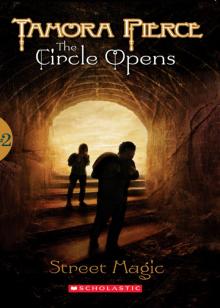 Street Magic
Street Magic Bloodhound
Bloodhound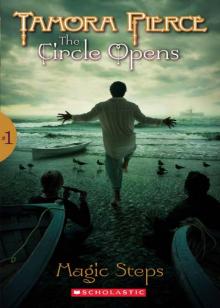 Magic Steps
Magic Steps Alanna: The First Adventure
Alanna: The First Adventure Emperor Mage
Emperor Mage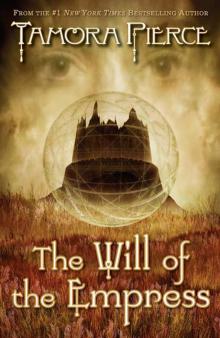 The Will of the Empress
The Will of the Empress The Realms of the Gods
The Realms of the Gods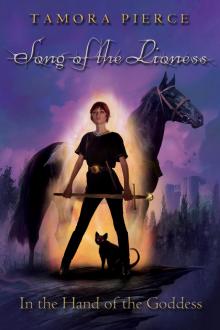 In the Hand of the Goddess
In the Hand of the Goddess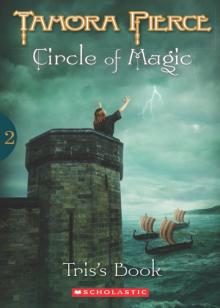 Tris's Book
Tris's Book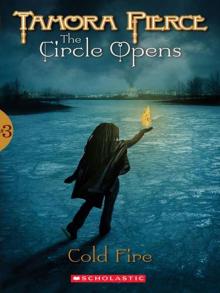 Cold Fire
Cold Fire Sandry's Book
Sandry's Book Wild Magic
Wild Magic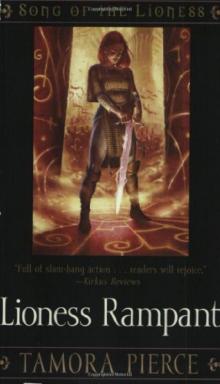 Lioness Rampant
Lioness Rampant The Woman Who Rides Like a Man
The Woman Who Rides Like a Man First Test
First Test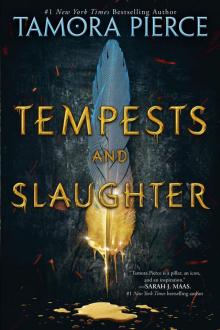 Tempests and Slaughter
Tempests and Slaughter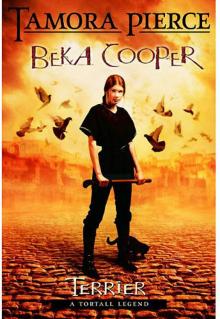 Terrier
Terrier Trickster's Queen
Trickster's Queen Squire
Squire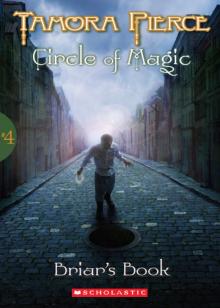 Briar's Book
Briar's Book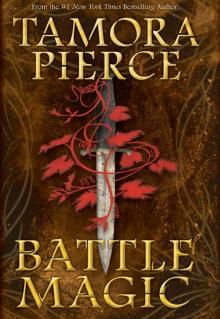 Battle Magic
Battle Magic Page
Page Melting Stones
Melting Stones Wolf-Speaker
Wolf-Speaker Mastiff
Mastiff The Song Of The Lioness Quartet #1 - Alanna - The First Adventure
The Song Of The Lioness Quartet #1 - Alanna - The First Adventure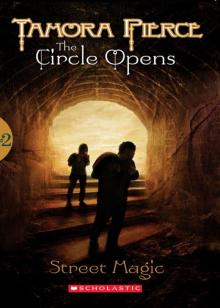 The Circle Opens #2: Street Magic: Street Magic - Reissue
The Circle Opens #2: Street Magic: Street Magic - Reissue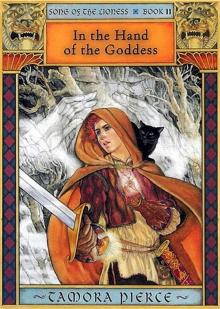 Tortall 1 - Song Of The Lioness #2 - In The Hand of the Goddess
Tortall 1 - Song Of The Lioness #2 - In The Hand of the Goddess Protector of the Small Quartet
Protector of the Small Quartet Beka Cooper 1 - Terrier
Beka Cooper 1 - Terrier Alanna
Alanna Trickster's Choice
Trickster's Choice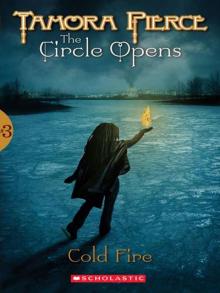 Circle Opens #03: Cold Fire
Circle Opens #03: Cold Fire In the Hand of the Goddess (The Song of the Lioness)
In the Hand of the Goddess (The Song of the Lioness)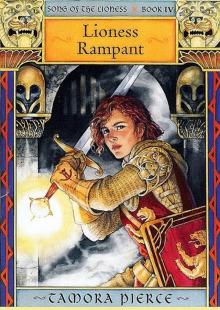 Song of the Lioness #4 - Lioness Rampant
Song of the Lioness #4 - Lioness Rampant Young Warriors
Young Warriors Tortall
Tortall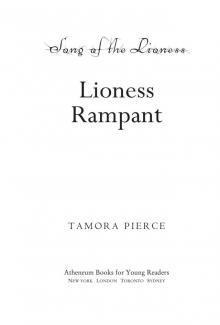 Lioness Rampant (Song of the Lioness)
Lioness Rampant (Song of the Lioness) Melting Stones (Circle Reforged)
Melting Stones (Circle Reforged) The Circle Opens #4: Shatterglass
The Circle Opens #4: Shatterglass